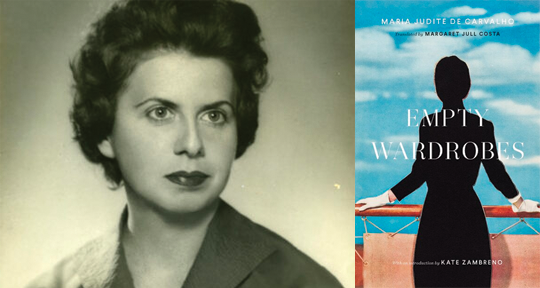Empty Wardrobes by Maria Judite de Carvalho, translated from the Portuguese by Margaret Jull Costa, Two Lines Press, 2021
The year is 1966. Conservative Portuguese dictator António Salazar is advancing in age. During his thirty-four-year reign, economic policies have failed to fulfill their initial promise, the regime’s supposed “political stability” has stifled the nation, and costly colonial wars have wearied its citizens. The Carnation Revolution, which will end his corporatist Estado Novo with virtually no blood spilled, is still eight years away. Into this climate of looming uncertainty and cautious hope, Maria Judite de Carvalho inserts her simmering novella, Empty Wardrobes, asking impossible questions about the nature of self-determination, ambition, and love. On the eve of a revolution, it dares to doubt whether or not the people will be brave enough to support each other, rather than the powers that be.
Empty Wardrobes sets its existential drama in the domestic sphere. Dora Rosário is a young widow with a daughter, Lisa—young by today’s standards, but “both ageless and hopeless” to the onlooker. She had loved her husband Duarte desperately while he lived, upheld his purity of character, and believed their life together to be a happy one—albeit with some financial troubles.
An egotistical Christ, she used to think; a secular, unbelieving Christ who had only come into the world in order to save himself. But save himself from what, from what hell? She felt no bitterness, though, when she thought all this, only a slight bittersweetness, or a secret sense of contentment because she did love him. He was a good man, a pure man, untouched by the surrounding malice and greed. He remained uncontaminated.
In his death, she devotes herself to his goodness like a nun. Her name, after all, means “rosary”’ and indeed she does seem to be ticking off days like beads. She passes one to get to the next, her mind wholly focused on “the good times”—the happy days of her marriage, which she hopes neither to retrieve nor improve upon.
We come to know Dora as a rather pitiable creature—self-effacing, above all. The precarious period of early widowhood leaves her with the impression that “she and Lisa were on one side, and all the others were on the other side. The others were the enemy from whom she could expect nothing good, only evil.” Isolation and poverty, however, degrade her pride much more easily than the memory of her late husband; ultimately, one cannot live on integrity alone. A lingering acquaintance gets her a job at an antique shop, though her husband had never wanted her to work. She raises Lisa in a bourgeois manner of which he would surely disapprove. There’s an inconsistency between Dora’s idolization of her husband and the actions she takes in order to survive—a paradox analogous to that of her fellow citizens, and of anyone who has been failed by a beloved ideology. An ideology, whether implemented on the national or domestic level, is not necessarily flexible enough to meet the challenges of daily life. Though she may toe the party line in public—and even in private—it’s a less obedient resourcefulness that allows her to prepare her daughter for a more optimistic future.


